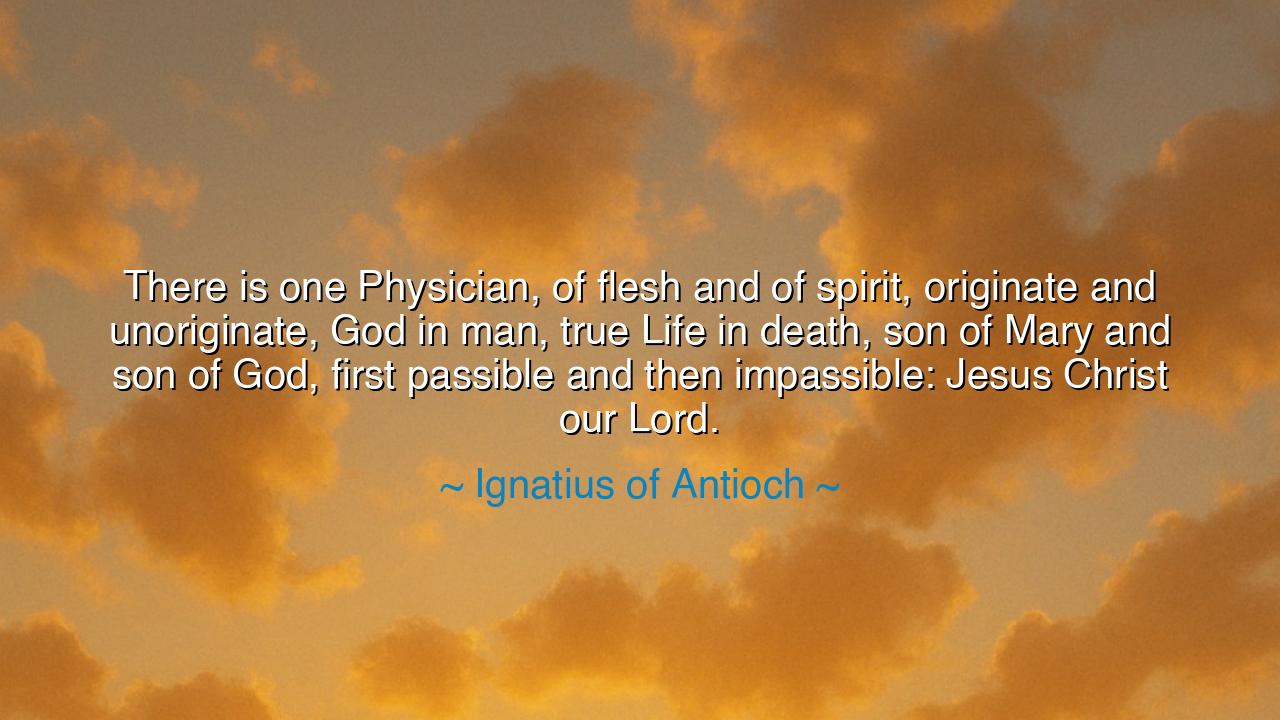
There is one Physician, of flesh and of spirit, originate and
There is one Physician, of flesh and of spirit, originate and unoriginate, God in man, true Life in death, son of Mary and son of God, first passible and then impassible: Jesus Christ our Lord.






The words of Ignatius of Antioch, spoken in the first century as he journeyed toward martyrdom in Rome, are among the most radiant testimonies of early Christian faith: “There is one Physician, of flesh and of spirit, originate and unoriginate, God in man, true Life in death, son of Mary and son of God, first passible and then impassible: Jesus Christ our Lord.” These words are not mere theology—they are a cry from the soul of a man who faced death with peace, for he had looked upon the Physician of all creation and found in Him both the cure and the courage to die.
In this passage, Ignatius reveals the mystery of the Incarnation, the joining of divine and human in one eternal being. The Physician is Christ, who heals not the body alone but the sickness of the soul—the wound of separation between man and God. To call Him “of flesh and of spirit” is to proclaim that He stands in both realms, bridging heaven and earth. He is originate and unoriginate—born in time through Mary, yet begotten from eternity as God. In Him, mortality and immortality meet; in His suffering, the eternal takes on pain so that the temporal may take on eternity.
Ignatius speaks from a time when the followers of Christ were hunted, imprisoned, and slain. Yet in the midst of persecution, his words burn with joy, not despair. To him, death was not defeat but healing—for the true Life is found only by passing through the gates of death, as the Physician Himself once did. When he calls Christ “first passible and then impassible,” he reminds us that Jesus first embraced pain and mortality (“passible”), so that, in resurrection, He might become beyond suffering (“impassible”). Thus, the healer took upon Himself the very sickness He came to cure—He entered the wound so that He might close it from within.
Consider the story of Ignatius himself, bound in chains and led to Rome to face the lions of the arena. As the crowds jeered, he rejoiced. To his captors he wrote letters filled not with fear, but with gratitude. He called his approaching death “the birth pangs of eternity.” For he believed, as he declared in this quote, that Christ had already conquered the ultimate enemy—death—and transformed it into the doorway to life. To Ignatius, martyrdom was not destruction but union, not loss but restoration in the hands of the Physician.
There is a profound tenderness in the image of Christ as the Physician. The ancient world was well acquainted with healers, yet none could cure the root illness of mankind—the sickness of the heart, the wound of sin, the ache of mortality. Ignatius saw that the remedy lay not in escape, but in transformation: that God Himself must enter human pain, suffer it, and redeem it. Thus, the cure was not administered from afar; it was lived from within. The Physician became the patient, that the patients might become whole.
For those who walk in doubt or grief, Ignatius’s words offer both comfort and challenge. Comfort, because they assure us that our suffering is not meaningless—it is shared by the One who knows it more deeply than we ever could. Challenge, because they call us to see beyond the body’s frailty to the soul’s destiny. The true Life in death is not merely a promise of heaven, but a way of living now—dying to selfishness, rising to compassion, and healing others as we have been healed.
Lesson and Practice:
Do not fear the wounds of life; let them be the places where the Physician works His art. When you suffer, remember that Christ Himself has walked the same path and sanctified it. When you despair, recall that what is passible now shall one day become impassible, beyond pain and decay. Strive to be a healer in the likeness of your Lord—bind up the broken, comfort the weary, and forgive the fallen. Live as one who has already been cured by divine mercy, and share that healing freely. For as Ignatius teaches, there is but one Physician, and His medicine is love strong enough to conquer death itself.






AAdministratorAdministrator
Welcome, honored guests. Please leave a comment, we will respond soon